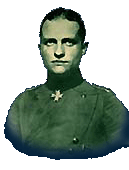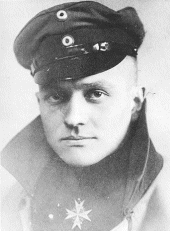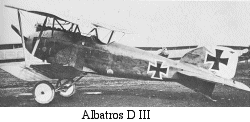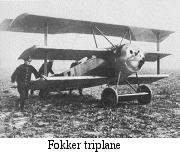Preface
 This
is the first of a series of WWI pilot biographies to appear at
Wings of Honor. I think that it's highly appropriate to begin
with the most celebrated and widely known WWI ace: Manfred von
Richthofen - the "Red Baron." As I began researching
this amazing individual, I came across this biography at Ursula's
History Web, and I immediately knew I could do no better. I think
you will not only find this biography of the Red Baron fascinating,
but it is VERY well written, and I would like to thank, once again,
Darren Dixon. Darren let me know that his mother, Ursula, recently
passed away and he is not only keeping the site up in her honor,
but will continue to build upon it. Please stop by Ursula's History Web and let Darren know how much
we appreciate this.
This
is the first of a series of WWI pilot biographies to appear at
Wings of Honor. I think that it's highly appropriate to begin
with the most celebrated and widely known WWI ace: Manfred von
Richthofen - the "Red Baron." As I began researching
this amazing individual, I came across this biography at Ursula's
History Web, and I immediately knew I could do no better. I think
you will not only find this biography of the Red Baron fascinating,
but it is VERY well written, and I would like to thank, once again,
Darren Dixon. Darren let me know that his mother, Ursula, recently
passed away and he is not only keeping the site up in her honor,
but will continue to build upon it. Please stop by Ursula's History Web and let Darren know how much
we appreciate this.
John "Jupes" Hansen, October 8, 2000
Childhood and Youth
 Albrecht
von Richthofen, was a professional soldier in the Prussian cavalry,
who had married Kunigunde von Schickfusss und Neudorf. Their first
child was a girl, Ilse, which was nice, but considered unimportant.
Next, came two boys, which were most important. They were born
in Breslau, Silesia, while Albrecht was stationed there. The first
boy came on May 2, 1892, and was named Manfred Albrecht, after
an uncle in the Imperial Guards. The second, Lothar, was born
in September 1894. Albrecht had decided even before he was married
that his first son, according to the custom in many Prussian military
families, would follow his father into the army. The children
had a relatively happy and carefree childhood. After Albrechtís
retirement the family moved to their estate at Schweidnitz, about
forty miles southwest of Breslau. There, Manfred, who was almost
nine years old, discovered guns. His father told him hunting stories
that captured his imagination, and shortly after, he asked his
father for an air rifle and got one. Manfred started to hunt all
the squirrel-sized animals around Schweidnitz he could find. At
age eleven, Manfred was sent to Wahlstatt, a cadet school near
Berlin. He disliked the cold gray former monastery with its simple
furnished rooms, the food, the long hours of study, and its motto:
"Learn to obey that you may learn to command". At the school he
won prizes for gymnastics, which made his instructors take a lenient
view of his scholastic shortcomings. At the end of the first academic
year he looked forward to spend the summer at Schweidnitz, hunting,
riding, shooting and eating real food, rather than the inferior
mush at the school. Also, his mother had given birth to his brother,
Karl Bolko, whom he had never seen. In all, Manfred spent six
years at the cadet school, and was elated to get away from there.
Albrecht
von Richthofen, was a professional soldier in the Prussian cavalry,
who had married Kunigunde von Schickfusss und Neudorf. Their first
child was a girl, Ilse, which was nice, but considered unimportant.
Next, came two boys, which were most important. They were born
in Breslau, Silesia, while Albrecht was stationed there. The first
boy came on May 2, 1892, and was named Manfred Albrecht, after
an uncle in the Imperial Guards. The second, Lothar, was born
in September 1894. Albrecht had decided even before he was married
that his first son, according to the custom in many Prussian military
families, would follow his father into the army. The children
had a relatively happy and carefree childhood. After Albrechtís
retirement the family moved to their estate at Schweidnitz, about
forty miles southwest of Breslau. There, Manfred, who was almost
nine years old, discovered guns. His father told him hunting stories
that captured his imagination, and shortly after, he asked his
father for an air rifle and got one. Manfred started to hunt all
the squirrel-sized animals around Schweidnitz he could find. At
age eleven, Manfred was sent to Wahlstatt, a cadet school near
Berlin. He disliked the cold gray former monastery with its simple
furnished rooms, the food, the long hours of study, and its motto:
"Learn to obey that you may learn to command". At the school he
won prizes for gymnastics, which made his instructors take a lenient
view of his scholastic shortcomings. At the end of the first academic
year he looked forward to spend the summer at Schweidnitz, hunting,
riding, shooting and eating real food, rather than the inferior
mush at the school. Also, his mother had given birth to his brother,
Karl Bolko, whom he had never seen. In all, Manfred spent six
years at the cadet school, and was elated to get away from there.
Now at age seventeen, Manfred spent another summer at home, and when autumn came, he was sent to the senior school at Berlin-Lichterfelde. Here, Manfred felt more at home and he began to take more interest in his studies. He had classes in military history and went on field exercises with real soldiers stationed at the Potsdam garrison. The young Baron had more free time here at this new school. Prince Frederick Karl became a friend, and together they roamed Berlin in their off-hours looking for decent restaurants and for good beer.
Manfred left Lichterfelde at the end of 1910 and entered the Berlin War Academy for a year of final polishing. Again, he did not like the new school and compared it with Wahlstatt. But as the end of his formal education was now in sight, he could not think of dropping out.
His Career in the Army
After his final examination at the War Academy, Manfred enlisted in the 1st Regiment of the Uhlans, which was stationed near Schweidnitz. Uhlans were cavalry lancers who specialized in reconnaissance and light combat. They were thought to be the most dashing soldiers, which suited the young Baron well. Life was getting much better. He was awarded his epaulettes in the fall of 1912. "It was a glorious feeling when people called me lieutenant", he said at the time. He settled into the pleasant life of peacetime garrison duty, close enough to home that he could ride there on weekends. His father had given him a mare named Santuzza when he received his commission, and he spent the rest of this idyllic autumn training his horse to jump. At the beginning of 1914, Manfred bought himself another horse, named Antithesis, which he planned to race later in the year. Twice he had broken his collarbone during steeplechases.
The state of the rest of the family was less than idyllic that autumn. A distant cousin of Manfred, the former Emma Maria Frieda von Richthofen had that previous May deserted her husband and their three children to run away with a relatively unknown writer named D.H Lawrence. Frieda and Lawrence began living together in Munich, which scandalized the family.
The newspapers in Germany had been warning through most of the winter and spring that war was almost upon Europe, but Manfred and his fellow officers did not believe it possible. There had been several alerts in the past weeks, so many in fact, that the officers in the Uhlan regiment just shrugged it off or laughed at it. A mother of one of the young officers visited and voiced her concerns about the newspaper headlines. She was assured that the journalists were wrong. Relieved, the lady invited her son and his friends to dinner. Halfway through the meal came another alert. It stopped the festivities for a moment, then the drinking and laughing started again. The next morning Germany was at war.
The War to End all Wars
Late in the night of August 2, Richthofen took a patrol of Uhlans out of the garrison at Ostrowo and along a narrow road leading to the frontier, six miles to the east. The soldiers reached the Prosna river, which formed the frontier, around midnight. They clattered over a wooden bridge, and a few seconds later they rode into enemy territory for the first time. Manfred was elated at leading his men into war, but he thought it a strange war. He did not know whether he was relieved or disappointed at not being shot at. The Russians should have guarded the bridge, but had not done so. He was so certain that there would be terrible shooting that before leaving the garrison, he scribbled his family a last will and testament.
All of a sudden the soldiers saw the church at Kielce. The orders were to observe the village and report enemy troop movements. Richthofen thought the church tower would make a good observation post, and raised his arm to signal a halt. He dismounted and told the priest that it was his painful duty to inform him that war had been declared, that the village was occupied by German soldiers, and that at the first sign of hostilities by its inhabitants, he, the priest, would be shot. The cleric probably did not believe the uncomfortable-looking young man of 22 years, but decided to humor him and led the soldiers to his church. Manfred reasoned that the ties between the Catholic and Russian Orthodox churches made the priest a security risk, but he was wrong. The Poles hated the Russians who occupied their country as much as the Germans who were trying to.
Just after midnight on the fifth day, the sentry alerted Manfred that there were Cossacks in front of the church. He ran out into the misty, raining night, and joined the sentry in the churchyard. They did not dare to join the patrol that was waiting with the horses in nearby woods. They carefully looked over the churchyard wall and saw about thirty Cossacks talking to the townspeople. They spent the night under dripping bushes. At dawn they watched the Russians ride away, but Manfred decided against returning to the church tower, fearing a trap. None of his dispatch riders had returned, so he was left with only the sentry in an unsafe position. He had been sent to Kielce to observe and had done this. He thought it safer to return at once to the garrison.
At the garrison they were received in disbelief. His fellow officers and comrades had heard that Richthofen and his men had been slaughtered by Cossacks in a bitter fight. The story did not make the newspapers, but it had reached Schweidnitz. While their son was dismounting to the cheers of his fellow officers, his parents were accepting condolences in their parlor filled with so many flowers that it looked like a botanical garden. When Manfred heard about his supposed battle with the Russians, he sent a cable to his parents, took a bath and fell into an exhausting sleep.
Within twenty-four hours Manfred and three other lieutenants were crowded into a train that was moving westward with the men, horses and equipment of the 1st Uhlans. They did not know where they were going. Apparently, Germany was leaving only three divisions on the Russian front, backed up by reserves. Everything else was poured into France in an effort to conquer it before the Russians had time to mobilize fully. Near the front, the 1st Uhlans climbed onto horses, tired from the sweltering train journey, and rode north toward Luxembourg and Belgium. The horses were well rested from the train trip, and by the time the Uhlans crossed into Belgium, they had traveled forty miles in one day. When they reached Arlon, it was time for a short rest. The French were only twenty miles away, and Manfred becoming excited, decided to climb the steeple of St. Donatís church. He looked through his binoculars, but the front was too far away. The next day he listened to the somber news that his cousin, another Richthofen, had been killed close by. On August 21st, the Uhlans were moved up to Virton, from where they could hear artillery and see smoke for the first time. The advancing cavalrymen passed dead soldiers and wounded men going the other way. The French Third Army had marched into the side of the German Fifth Army. The Germans turned on them and fired so many bullets that their machine guns became too hot to touch. The French were cut down in droves and the rest retreated. While the infantry waited for the guns to cool, the Uhlans were brought up to find the French and see if they could fight some more. In an open field Manfred raised his arm to signal for "close up and follow order". He turned his horse around, but his men had mistaken the signal for "come forward". They charged ahead and bunched in front of him, while bullets dug into the tangled mass of men and horses. The clearing began to fill with smoke, and the Germans reorganized enough to gallop away from the ambush. Manfred had lost ten men; he was stunned, but unhurt. His war had begun.
Manfredís brother Lothar was in one of the dragoon regiments, while his youngest brother was now at the cadet school at Wahlstatt. The French forts at Verdun, which guarded the approach to Paris, could not be taken. The British Expeditionary force, which had retreated from Mons, were supported by French troops and then counterattacked, fighting the Germans to a standstill. Manfred believed that the cavalry was finished, and this was confirmed when he was suddenly transferred to the signal corps. There he had to crawl through the trenches with dispatches, and later laid telephone wires between the trenches and the command posts. It was not exactly the work of a cavalryman. He was awarded the Iron Cross (third class) for his duty in the trenches. It was far from the most prized award bestowed by the Kaiser, as more than five and a half million men were awarded the medal between 1813 and 1918. But, it was something to show that at least he had gone to war.
The Imperial Air Service
 Manfred
passed the winter and the early spring of 1915 sitting in cold
dugouts, watching the war go on without him. Often he looked up
and saw lone airplanes fly by on observation missions, missions
that six months before had been the job of the cavalry. Now, the
Imperial Air Service was the lookout for the army. He began to
toss the idea around to become an aviator. In April, he heard
that a large-scale attack was planned on Verdun. He stopped thinking
about airplanes and wondered what part the Uhlans would play in
the coming offensive. His question was answered when he was transferred
to the Supply Corps. With that, his Prussian mind rebelled. He
wrote a short letter, asking for a transfer to the Imperial Air
Service. Soon, Manfred happily packed his bags and headed for
the No.7 Replacement Section at Cologne for observer training.
Manfred
passed the winter and the early spring of 1915 sitting in cold
dugouts, watching the war go on without him. Often he looked up
and saw lone airplanes fly by on observation missions, missions
that six months before had been the job of the cavalry. Now, the
Imperial Air Service was the lookout for the army. He began to
toss the idea around to become an aviator. In April, he heard
that a large-scale attack was planned on Verdun. He stopped thinking
about airplanes and wondered what part the Uhlans would play in
the coming offensive. His question was answered when he was transferred
to the Supply Corps. With that, his Prussian mind rebelled. He
wrote a short letter, asking for a transfer to the Imperial Air
Service. Soon, Manfred happily packed his bags and headed for
the No.7 Replacement Section at Cologne for observer training.
 At seven oíclock one morning in early June 1915, Cavalry Lieutenant
Manfred Freiherr von Richthofen climbed a ladder resting against
the body of an Albatros observation plane. The noise of the engine
was so loud that the pilot behind him could not hear him, even
when he shouted. Full of anxiety at first, he soon felt powerful.
He was trespassing on Godís domain and, incredibly, getting away
with it. When he saw the huge cathedral of Cologne, he was overcome
with the feeling that he was privy to secrets forbidden to mere
mortals. After landing, he looked forward to his next flight.
At last he seemed to have found his place in this war, although
he no longer had any illusions about the outcome of this conflict.
He hitched rides on airplanes to Schweidnitz on weekends, and
on one of these visits home he astounded his mother with his prediction
of the warís outcome as early as mid-1915: "I donít believe we
will win this war".
At seven oíclock one morning in early June 1915, Cavalry Lieutenant
Manfred Freiherr von Richthofen climbed a ladder resting against
the body of an Albatros observation plane. The noise of the engine
was so loud that the pilot behind him could not hear him, even
when he shouted. Full of anxiety at first, he soon felt powerful.
He was trespassing on Godís domain and, incredibly, getting away
with it. When he saw the huge cathedral of Cologne, he was overcome
with the feeling that he was privy to secrets forbidden to mere
mortals. After landing, he looked forward to his next flight.
At last he seemed to have found his place in this war, although
he no longer had any illusions about the outcome of this conflict.
He hitched rides on airplanes to Schweidnitz on weekends, and
on one of these visits home he astounded his mother with his prediction
of the warís outcome as early as mid-1915: "I donít believe we
will win this war".
The Flying Observer
Manfred worked hard at Cologne, and of the thirty men, he finished in first place. On June 10th, he was sent to Grossenhain for two more weeks of training. It was later extended to twelve weeks, but in the first year of aerial observation, observers were scarce, and they were cranked out as soon as possible. Besides flying, Manfred had instructions in map reading, troop and artillery spotting, camouflage recognition, bomb dropping, use of compass and telescope, meteorology and photography. He had to draw maps in flight of what he saw and have them finished and ready for use before he landed. Finally, he was taught enough about the airplaneís engine and control system, that in case of a forced landing, he could make emergency repairs sufficient to get into the air again.
Lieutenant Zeumer, a reckless, daring pilot, was assigned to fly Manfred. Soon they had arguments about the definition of bravery and suicide. This pilot was so reckless, that it affected Manfredís nerves. Then he heard that Count Holck was coming, and Manfred knew immediately that this was his man. The two men got on well, and they went on many observation flights together. One day they had no orders to fly, because the squadron was moving to a new airdrome. The Russians were retreating from German troops led by Field Marshal von Mackensen, and the two airmen wanted to see what a withdrawal looked like from the air. Flying at 4.500 feet the Albatros suddenly started to reel violently. They had to get the plane back to their lines. It sputtered on, losing altitude, and the Russians started to fire at them. When the plane was well below 1000 feet, several bullets went into the engine, and one knocked off a piece of the propeller. Holck tried to keep the planeís nose up, skimming over clusters of trees and bushes, finally crashing down between them. The landing gear and a wing were ripped off, but everything else stayed together. They had made it to their lines, but both men were badly shaken. Somehow, they got to their new airdrome on horseback. There they found orders to report to different squadrons on the western front.